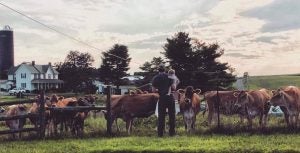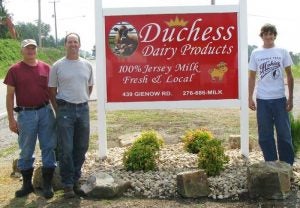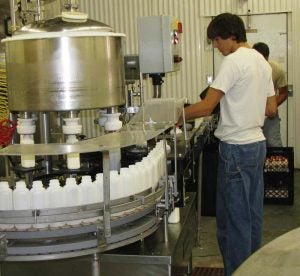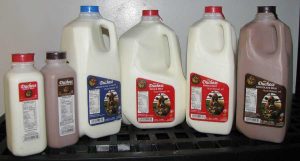With news coverage detailing falling milk prices and family dairies shutting down, there is one dairy farm, located in Rural Retreat, Virginia, that decided to try something different.
Huffard Dairy Farms was started in 1929 by James Huffard Sr. Now, nearly 90 years later, the farm is run by his grandsons, James “Jim” Huffard III and John Huffard, and great-grandson, James “Trey” Huffard IV. The 660-acre dairy farm milks approximately 400 Jersey cows twice a day. Of those 660 acres, 250 are used as a corn/rye rotation, 200 are used for hay production, and the remainder is for grazing.
In addition to Jim, John, and Trey on the farm, they have seven full-time employees.

The strategy that the Huffards have implemented focuses on expanding slowly, limiting the use of borrowed money, and internal growth through utilization of replacement heifers. Starting out, the dairy milked cross-bred dairy cows. Jim and John Huffard started researching and evaluating which breeds of dairy cattle made the most money with the winner being the Jersey cow.
“We wanted to milk the cow that makes the most money. It didn’t matter if she is purple, green, black or white,” Jim said.
The Huffards put a lot of focus on the genetics side of their dairy cattle. Since graduating from Virginia Tech in 2014, Trey returned to the farm with a passion for continual improvement of the herd’s genetics. Some key factors that they look at when breeding the cows are CFP (combined fat and protein), fertility, and overall functional type.
Although more expensive than conventional breeding, the Huffards use sexed semen when breeding their cows and heifers. This allows them to minimize the amount of bull calves born and continually grow their heifer inventory. The heifers are kept either as replacement heifers for the farm or sold as bred heifers to other dairies. More than 50 percent of the animals born on the dairy are genomic tested to identify elite genetics to be marketed privately. Trey has recently implemented an In-Vitro Fertilization embryo transfer program — the goal of which is to produce calves with high genomic evaluations that are then marketed at premium prices.

The rise of Duchess Dairy Products
In late 2009, an opportunity arose for the Huffards to purchase a bottling plant just a few miles away from their farm. The Huffards partnered with another Jersey farm and purchased the facility.
Although the plant was fairly new, a lot of improvements were made, including adding tanks, a new heating system for the water, a new cooling system for the milk, spray-in insulation, an office addition, and newer trucks. Starting in 2010, Duchess Dairy Products was up and running. The name “Duchess” came from the nickname Jim and John’s father called their mother, June.
Duchess Dairy employs three full-time and two part-time employees. Milk is bottled two days a week and delivered to retailers five days a week.
All of the milk that the plant uses comes directly from Huffard Dairy Farms. The farm provides about 4,000 gallons of milk per week to the bottling plant. The remainder of milk produced by the farm goes to the Dairy Farmers of America cooperative, which in turn distributes the milk to Ashe County, North Carolina, to be made into cheese; to Staunton, Virginia, to be bottled as Promised Land Jersey Milk; or to Winston Salem, North Carolina, to be blended with other milk.
“It’s nice to see Jersey milk have a strong demand during a time of surplus milk,” Trey said.
Duchess Dairy milk has the Queen of Quality label, which is a trademarked label used to distinguish 100 percent Jersey milk products. According to an independent nutritional analysis, it was found that Duchess Dairy Products contain 17.5 percent more calcium and 13.02 percent more protein than three competitors’ 2 percent milk. As mentioned previously, Jersey milk contains a higher amount of fat which adds to the milks flavor.
“We want people to enjoy the flavor of milk,” Trey said.
Starting out, Duchess Dairy Products sold milk, butter, and yogurt. They have since discontinued producing butter and yogurt and focus solely on bottled milk as well as selling cream to be used by a local operation in their ice-cream. Types of milk sold by Duchess Dairy Products include whole milk, 2 percent milk, chocolate milk, egg nog (Christmastime), strawberry milk (summer), and mocha latte-flavored milk. The most popular milk with customers, according to Trey, is the chocolate milk and whole milk.
The milk can be found throughout southern Virginia in local convenience and grocery stores. Duchess Dairy milk is also in vending machines in the nearby Wythe County Public School system, and they supply milk to local high school football teams.

Diversification and local support
In a time when consumers want to know where and how their food is produced, Duchess Dairy Products is providing a value-added product in that the cows are fed with feed produced on the farm, milk is transported a few miles from the farm to the bottling facility, and then distributed to local stores.
Integrating the bottling facility into an existing dairy operation is a perfect example of how a farm can diversify and expand its products to reach different consumers.
As for future plans and advice for younger generations returning to the family farm, Trey says he decided on his own to come back to the farm after graduating from college.
“You really have to want to do the work and you have to be happy doing it. If we were doing it for the money, we would’ve been out a long time ago,” Trey said.
He enjoys getting to work alongside his dad, uncle, and team of employees every day, as well as “agvocating” and connecting the consumer to the work that he does.
“After all the long hours, it feels great to know local families are enjoying your products,” he said.
These dairy entrepreneurs continue to look for new opportunities. Huffard Dairy Farms is currently in the process of constructing a new freestall barn. Once it is complete, they plan to increase the herd by 50 to 100 cows. And Duchess Dairy Products is looking at getting back into offering yogurt.

Virginia Jones is a graduate of Virginia Tech with a major in Agribusiness and a minor in Animal and Poultry Sciences.



